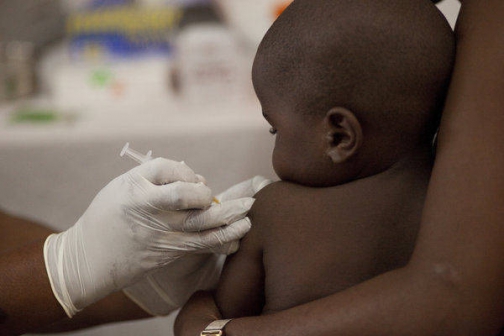 More than 200 million people are diagnosed with the disease annually - killing 430,000 every year.
More than 200 million people are diagnosed with the disease annually - killing 430,000 every year.
The RTS,S vaccine trains the immune system to attack the malaria parasite, which is spread by mosquito bites.
The World Health Organization (WHO) said the jab - to be launched in Ghana, Kenya and Malawi - had the potential to save tens of thousands of lives.
The vaccine needs to be given four times - once a month for three months and then a fourth dose 18 months later.
This has been achieved in tightly controlled and well-funded clinical trials, but it is not yet clear if it can be done in the “real-world” where access to health care is limited.
This is why the WHO is running pilots in three countries to see if a full malaria vaccine programme could be started. It will also continue to assess the safety and effectiveness of the vaccination.
Dr Matshidiso Moeti, the WHO regional director for Africa, said: “The prospect of a malaria vaccine is great news.
“Information gathered in the pilot programme will help us make decisions on the wider use of this vaccine.
“Combined with existing malaria interventions, such a vaccine would have the potential to save tens of thousands of lives in Africa.”
The pilot will involve more than 750,000 children aged between five and 17 months. Around half will get the vaccine in order to compare the jab’s real-world effectiveness. In this age group, the four doses have been shown to prevent nearly four in ten cases of malaria.
This is much lower than approved vaccines for other conditions. It also cuts the most severe cases by a third and reduces the number of children needing hospital treatment or blood transfusions. But the benefits fall off significantly without the crucial fourth dose.
Ghana, Kenya and Malawi were chosen because they already run large programmes to tackle malaria, including the use of bed nets, yet still have high numbers of cases.
Each country will decide how to run the vaccination pilots, but high-risk areas are likely to be prioritised. Malaria remains one of the world’s most stubborn health challenges. Bed netting and insecticides are still the chief protection.
Sub-Saharan Africa is the hardest hit by the disease, with about 90% of the world’s cases in 2015.
Malaria spreads when a mosquito bites someone already infected, sucks up blood and parasites, and then bites another person.
A global effort to counter malaria has led to a 62% cut in deaths between 2000 and 2015, the WHO said.
But the UN agency has said in the past that such estimates are based mostly on modelling, and data is so poor for 31 countries in Africa - including those believed to have the worst outbreaks - that it could not tell if cases have been rising or falling in the last 15 years.
The vaccine will be tested on children aged from five to 17 months to see whether protective effects shown so far in clinical trials can hold up under real-life conditions.
At least 120,000 children in each of the three countries will receive the vaccine, which has taken decades of work and hundreds of millions of dollars to develop.
The WHO is hoping to wipe out malaria by 2040 despite increasing resistance problems to both drugs and insecticides used to kill mosquitoes.
The malaria vaccine has been developed by pharmaceutical company GlaxoSmithKline, and the £38 million for the first phase of the pilot is being funded by the global vaccine alliance GAVI, UNITAID and Global Fund to Fight AIDS, Tuberculosis and Malaria.
Malaria is also present in south-east Asia, Latin America and the Middle East.
 The Standard Group Plc is a multi-media organization with investments in media
platforms spanning newspaper print
operations, television, radio broadcasting, digital and online services. The
Standard Group is recognized as a
leading multi-media house in Kenya with a key influence in matters of national
and international interest.
The Standard Group Plc is a multi-media organization with investments in media
platforms spanning newspaper print
operations, television, radio broadcasting, digital and online services. The
Standard Group is recognized as a
leading multi-media house in Kenya with a key influence in matters of national
and international interest.











